To accompany your Come Follow Me study for March 28-April 3
In addition to reading these chapters, you may want to:
- See the video Come Follow Me LDS 2022 (Mar 28-Apr 3) Exodus 7-13 | Let My People Go! at https://www.youtube.com/watch?v=t6NKcMq2yYk
- See the video The Plagues of Egypt at https://www.youtube.com/watch?v=jbA-7smfZ74
- See the segment “Disasters Strike Egypt” from The Ten Commandments at https://www.youtube.com/watch?v=qofp7q7l0nI
- See the video The Passover at https://www.youtube.com/watch?v=4TMzIOkD-A0
If you would like a Kahoot game related to this material which you could use for personal study or use with your family or your class, click here: https://create.kahoot.it/share/exodus-7-13/757eabd2-c45f-42dc-93fe-d5d56b6c5e4b
Points to Ponder in Exodus 7-13
1. These seven chapters are some of the most revelation-rich and miracle filled in all of scripture. How many separate occasions can you identify on which the Lord is recorded of having spoken to Moses alone? On how many did He speak to both Moses and Aaron together? (Admittedly, it is sometimes difficult to tell if such cases as 7:19 were separate from the preceding revelation, or just a continuation of it.)
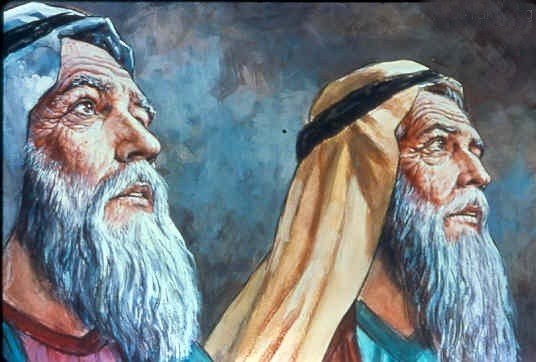
2. How many miracles can you find which were accompanied by Aaron’s using his rod or hands? How many times was it Moses who used the rod or his hands to produce a miracle?
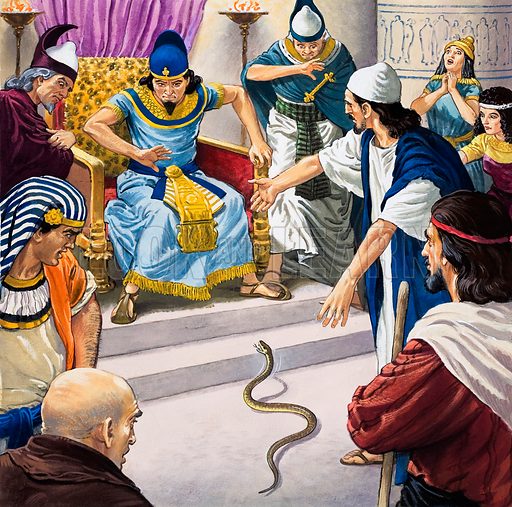
3. What reasons can you think of for the Lord’s involving Aaron as much as He did in receiving revelation and performing miracles? Why not just let Moses do it, as the head prophet?

4. What did the Lord mean when He told Moses that He had made him a “god” to Pharaoh? Was the Pharaoh supposed to bow down to Moses? Pray to him?
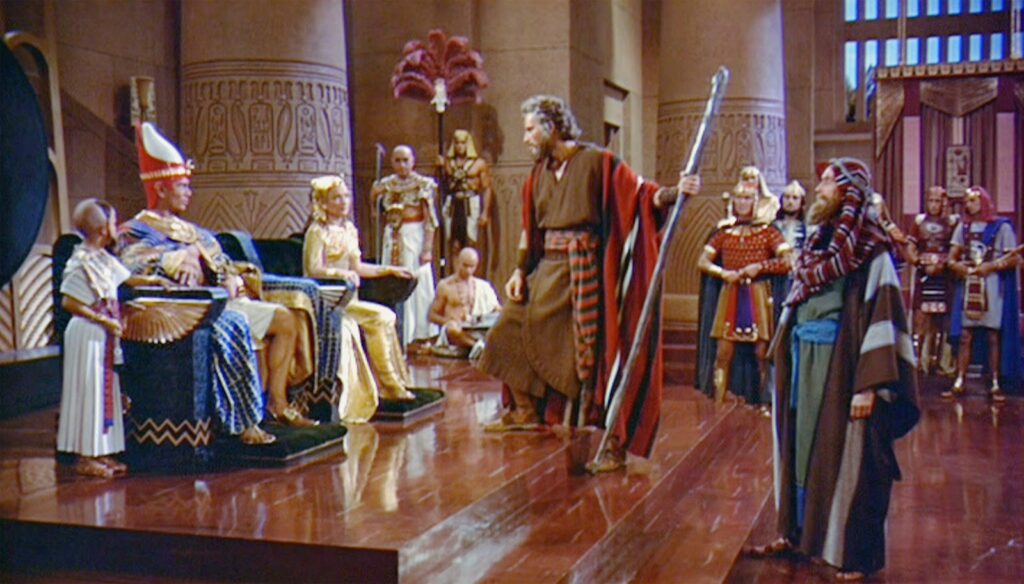
5. Which of the plagues were Pharaoh’s magicians able to duplicate? Which could they counteract?
6. Not counting the imposition of the 10 plagues, what miracles did the Lord perform in this week’s reading?
7. What special symbolism do you see in the Lord’s instructions concerning the first Passover? (Ex. 12.) What other symbolism related to Christ’s life or death can we discover in these chapters?
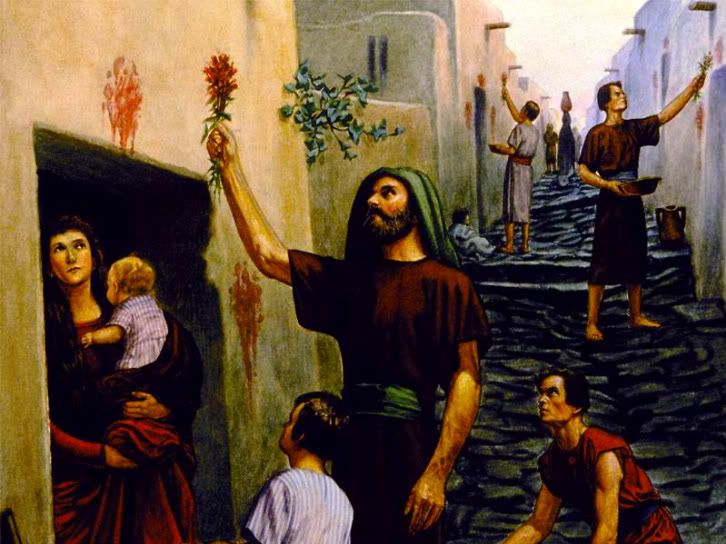
8. What modern-day commandment carries with it a promise that the obedient will be spared by the same destroying angel which spared the obedient ancient Israelites?
9. In summary, what are the main points or principles you think the Lord (and Moses) would want us to remember from Exodus 7-13?
Possible Answers to Points to Ponder in Exodus 7-13
1. These seven chapters are some of the most revelation-rich and miracle filled in all of scripture. How many separate occasions can you identify on which the Lord is recorded of having spoken to Moses alone? On how many did He speak to both Moses and Aaron together? (Admittedly, it is sometimes difficult to tell if such cases as 7:19 were separate from the preceding revelation, or just a continuation of it.)
I find 16 references to the Lord evidently speaking to Moses alone:
- 7:1
- 7:14
- 7:19
- 8:1
- 8:5
- 8:16
- 8:20
- 9:1
- 9:13
- 9:22
- 10:1
- 10:12
- 10:21
- 11:1
- 11:9
- 13:1
There are four references to the Lord speaking to Moses and Aaron together:
- 7:8
- 9:8
- 12:1
- 12:43
2. How many miracles can you find which were accompanied by Aaron’s using his rod or hands? How many times was it Moses who used the rod or his hands to produce a miracle?
Aaron:
- 7:10
- 7:20
- 8:6
- 8:17
Moses:
- 9:23
- 9:33
- 10:13
- 10:22
3. What reasons can you think of for the Lord’s involving Aaron as much as He did in receiving revelation and performing miracles? Why not just let Moses do it, as the head prophet?
- To begin with, Moses was not initially confident in his prophetic calling. Just as it was helpful for him to have Aaron as his spokesman, so did it presumably help Moses to know he was not alone in other responsibilities.
- Secondly, Aaron could serve as a second witness of the things of which Moses was declaring, just as Amulek did with Alma in Ammonihah.
- Finally, the Lord is building Aaron in the process. As Moses would later teach in Numbers 11:29, “Would God that all the Lord’s people were prophets, and that the Lord would put his spirit upon them!” Aaron would not grow as he needed to do if Moses did everything himself. For similar reasons, we are told in the JST version of John 4:2 that while Jesus baptized, He “baptized not so many as his disciples.” We have seen a similar manifestation of this principle in recent years, where President Russell M. Nelson has not dedicated so many temples as he has assigned his counselors or members of the Quorum of the Twelve to dedicate.
4. What did the Lord mean when He told Moses that He had made him a “god” to Pharaoh? Was the Pharaoh supposed to bow down to Moses? Pray to him?
The passage could be considered true just as it stands. As the Lord told modern Israel in D&C 21:4-5 that they were to receive the Lord’s prophet’s words “as if from mine own mouth,” so was Pharaoh supposed to listen to Moses as though God had spoken to him personally and directly. Unfortunately for the Pharaoh, he refused to do so.
However, it is worth noting that Joseph Smith changed this passage (Exodus 7:1) in the Joseph Smith translation to read, “I have made thee a prophet to Pharaoh, and Aaron thy brother shall be thy spokesman.”
5. Which of the plagues were Pharaoh’s magicians able to duplicate? Which could they counteract?
They could duplicate only the first two–water to blood and frogs–and could counteract none of them. They could also turn their rods into serpents—which were devoured by Aaron’s serpent/rod!

6. Not counting the imposition of the 10 plagues, what miracles did the Lord perform in this week’s reading?
- 7:10: Aaron’s rod becomes a serpent.
- 7:12: Aaron’s serpent/rod swallows up those produced by the magicians of Pharaoh.
- 7:13: The Lord causes the plague of frogs to miraculously cease.
- 8:31: The Lord causes the swarms of flies to miraculously disappear.
- 9:33: The Lord causes the thunder and hail to dramatically cease.
- 10:19: The Lord brings a strong west wind and blows the locusts into the Red Sea.
- 11:3: “The Lord gave the people favour in the sight of the Egyptians,” such that they were willing to send the Israelites away with much gold and silver.
- 13:18: God led the Israelites through the wilderness.
- 13:21: The Lord gave Israel a pillar of a cloud to lead them by day.
- 13:21: The Lord similarly gave Israel a pilar of fire to provide light by night.
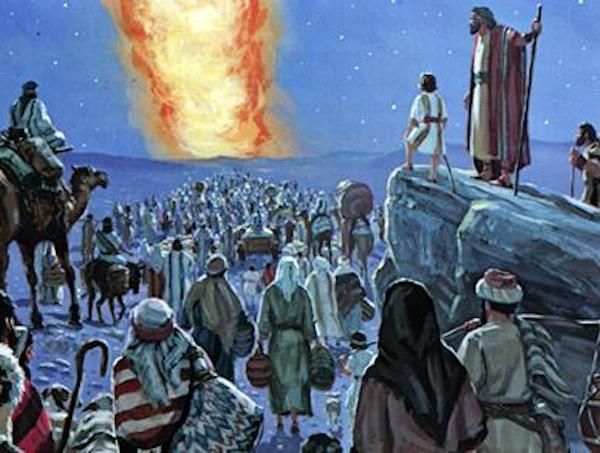
7. What special symbolism do you see in the Lord’s instructions concerning the first Passover? (Ex. 12.) What other symbolism related to Christ’s life or death can we discover in these chapters?
- The lamb without spot or blemish symbolized Christ.
- The blood symbolized His.
- The lamb was to be killed in the evening. Jesus also died in the late afternoon.
- Bitter herbs were to be eaten with it, symbolizing the bitterness of their captivity.
- They were to break none of its bones, as Christ’s bones would not be broken.
- The plague of three days of darkness either intentionally or coincidentally corresponds to the three days experienced by the Nephites following the Savior’s crucifixion.
8. What modern-day commandment carries with it a promise that the obedient will be spared by the same destroying angel which spared the obedient ancient Israelites?
The Word of Wisdom (D&C 89:21)
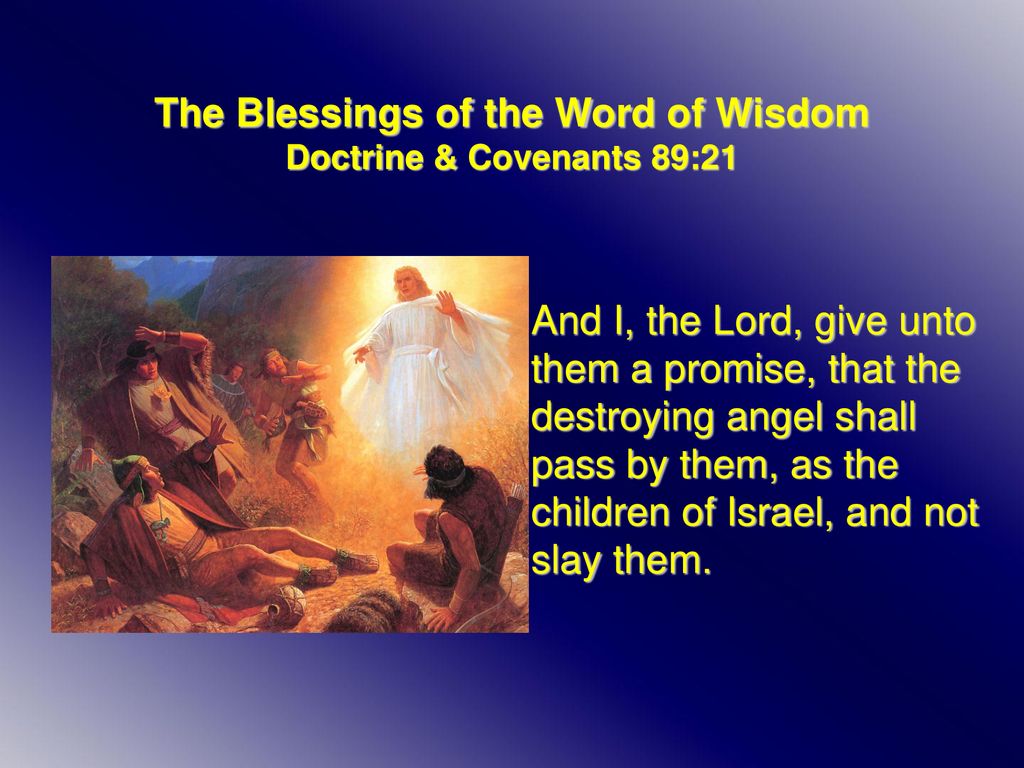
9. In summary, what are the main points or principles you think the Lord (and Moses) would want us to remember from Exodus 7-13?
Your choice. Mine might be:
- As God spoke often to Moses and Aaron, so may we confidently believe He speaks to their successors today.
- Miracles are real, and God is just as interested in leading us out of our individual “captivity,” sins, and challenges as He was in leading Israel out of Egypt.
- The adversary has great power, but the Lord’s power is greater. We can never be conquered by evil if we will align ourselves with God.
- Just as God delegated much to Moses, who in turn delegated to Aaron, so should we build our associates by letting them serve and grow.
- It is important to keep our word. The Pharaoh broke his multiple times. He and his people would not have suffered so much had he been willing to follow through with his first promise to let the Israelites go.
- The Lord uses symbols to remind us of Him and the atonement. The sacrament is for us what the Passover symbols were for ancient Israel.
- Even before the giving of the Ten Commandments, the Lord indicated that the seventh day had special significance. (Ex. 12:16.) The only work permitted thereon was that necessary in order for the people to eat.

